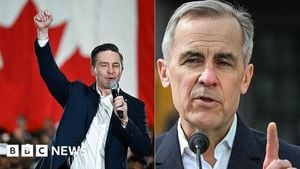Natalie Harp, the woman affectionately dubbed as Donald Trump’s “human printer,” has emerged as one of the most recognizable figures within the former president’s inner circle. A recent excerpt from journalist Michael Wolff’s new book sheds light on Harp's intriguing role, detailing not only her close relationship with Trump but also the accompanying concerns from the Secret Service.
At 33, Harp is no stranger to the media spotlight. Prior to joining Trump’s 2022 presidential campaign, she spent two years as an anchor at the conservative One America News Network. Her transition to the political sphere was fueled by her compelling personal story. Harp, who grew up in a conservative Christian family, credits Trump’s Right to Try law for her survival from bone cancer, declaring it pivotal to her recovery. It is this narrative of overcoming adversity and benefiting from experimental therapies, which has undoubtedly shaped her advocacy for patients’ rights and her subsequent political aspirations.
Harp’s academic credentials include a Bachelor of Arts from Point Loma Nazarene University, complemented by an MBA from Liberty University. Her educational background laid the groundwork for her assertive advocacy within political circles. From writing opinion pieces to receiving invitations to speak at significant political events, including the Faith & Freedom Coalition’s conference, her media presence steadily grew until it eventually caught Trump’s attention, leading to her role on his campaign communications team.
So, what is it about Harp’s relationship with Trump that's raised eyebrows? Wolff’s book details her nickname, “human printer,” derived from her unique role of providing Trump with curated news and information printed on demand. During his presidency, Trump became known for preferring tangible paper over digital screens, and Harp’s constant presence ensured he had access to the news and information he wanted.
“He would often demand time in his schedule to go over ‘my papers,’” Wolff writes, highlighting just how integral her curatorial efforts became to Trump’s daily routine. Interestingly, during this process, Harp only printed out what she believed Trump might find valuable, sometimes leading to peculiar outcomes. Wolff describes one chaotic incident where Trump’s printed pages went flying during “an abrupt takeoff,” exposing the assembly of outmoded articles and quirky fan art. This unconventional selection created quite the stir, leading to staff confusion and concerns about the nature of the information consuming Trump’s time.
Aside from managing Trump’s information intake, Harp plays other significant roles, such as maintaining his social media presence on Truth Social. She is tasked with communicating directly with Congress members, polling them on their views and sharing articles relevant to legislative moves. Such responsibilities place her at the intersection of media and governmental discourse, amplifying her influence within Trump’s administration.
Interestingly, Harp's zeal may also be what troubles those around Trump. Reports suggest the Secret Service expressed concern about her intense devotion to him, noting her tendency to write adoring letters. Trump himself dismissed these concerns, asserting, “She just loves her president.” Yet, the Secret Service remained watchful; as Wolff reported, Harp was deemed potentially dangerous, not necessarily to Trump, but to herself, due to her infatuation.
This vigilant oversight became evident during summer outings at Trump's golf course, where Harp was often spotted trailing alongside him, sometimes following in her own golf cart. Her devoted nature led to staff attempts to distance her from Trump, resulting in Harp’s unconventional accommodation arrangements. She informed grounds staff of her preference to stay close to Trump, eventually opting for space among the women’s locker room for immediate access to him.
The peculiarities of Harp's relationship with Trump have attracted media scrutiny, particularly after revelations about the nature of her letters. One letter reportedly declared, “you are all I care about,” and referred to Trump as her “Guardian and Protector.” These disclosures have ignited discussions surrounding the dynamics within Trump’s inner circle, raising questions about how personal emotions can intertwine with political decision-making.
Throughout her tenure, Harp has become more than just another aide; she serves as both gatekeeper and supporter, shaping how Trump receives and processes information. Her advocacy work, stemming from her battle with cancer and the belief she holds about the impact of Trump’s policies, has established her as not just one more voice close to the president but as a potentially influential player within his political narrative.
Whether Harp’s intense closeness to Trump will bolster or hinder her role going forward remains to be seen, but it’s clear she has positioned herself as a key figure worth watching as the political scene prepares for the next electoral battleground.



